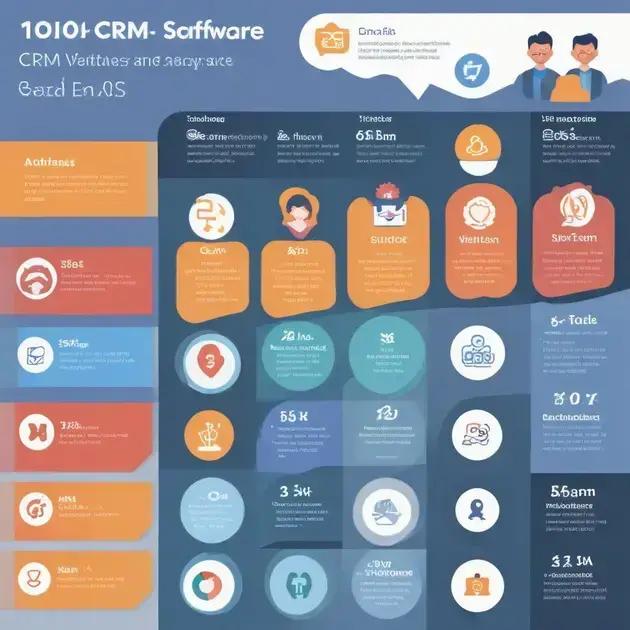Choosing the right CRM software can significantly enhance customer relationships and business efficiency. Essential factors include identifying your needs, ensuring ease of use, and selecting scalable options. Proper implementation and user training are key to maximizing the benefits of your CRM system.
Looking for the best top 10 CRM software? Choosing the right CRM can be a game-changer for your business, optimizing customer relationships and boosting sales. In this article, we’ll dive into the top picks, how they can benefit your operations, and tips on selecting the right one for your needs.
What is CRM Software?
Customer Relationship Management (CRM) software is a tool that helps businesses manage their interactions with customers and potential clients. These systems store customer contact information, track sales leads, and analyze customer data to improve business relationships.
Key Features of CRM Software
CRM software typically includes contact management, sales management, productivity tools, and often an integrated marketing solution. This allows businesses to automate processes, manage customer communications, and enhance customer satisfaction.
Types of CRM Software
There are several types of CRM software, including operational, analytical, and collaborative CRMs. Operational CRMs focus on the sales and customer service aspects; analytical CRMs help businesses analyze customer data for insights; while collaborative CRMs allow multiple teams to work together on customer interactions.
How CRM Software Can Benefit Your Business
Implementing a CRM system can lead to increased sales, better customer service, and improved customer retention. By streamlining processes, businesses can focus on building relationships and meeting customer needs more effectively.
In summary, understanding what CRM software is and how it functions can empower businesses to leverage its full potential, leading to stronger customer relationships and enhanced operational efficiency.
Benefits of Using CRM Software

Utilizing CRM software offers a multitude of benefits for businesses of all sizes. By centralizing customer data, businesses can streamline their interactions with clients and gain deeper insights into customer behavior.
Improved Customer Relationships
One of the key advantages of CRM software is that it enables businesses to personalize their interactions with customers. By tracking previous interactions and preferences, companies can tailor their communications and services, leading to enhanced customer satisfaction.
Increased Sales Efficiency
CRM systems help sales teams by providing tools that streamline the sales process. Features such as lead tracking, automated follow-ups, and sales forecasting enable teams to prioritize their efforts and close deals more effectively.
Better Data Analysis
With a CRM, businesses can analyze customer data to understand sales patterns and customer issues. This analysis fosters better decision-making and helps identify opportunities for further sales or service improvement.
Enhanced Collaboration
CRM tools promote collaboration among team members by providing a centralized platform for viewing customer data. This connectivity ensures that all staff members are on the same page and can access up-to-date information, making teamwork more effective.
Overall, the benefits of using CRM software translate directly into business growth, improved customer satisfaction, and increased operational efficiency.
Top 10 CRM Software Options
When searching for the best CRM software, it’s important to consider options that cater to various business needs. Here are the top 10 CRM software options available that can enhance your customer relationship management.
1. Salesforce
Salesforce is one of the most popular CRM platforms in the world. It offers robust customization options, extensive app integration, and powerful analytics.
2. HubSpot CRM
HubSpot CRM is known for its user-friendly interface and is free for basic features. It provides tools for sales automation, pipeline management, and customer support.
3. Zoho CRM
Zoho CRM is a cost-effective solution that includes features like AI-driven sales predictions, automation tools, and extensive customization options.
4. Microsoft Dynamics 365
This CRM integrates seamlessly with other Microsoft products and provides advanced features for sales, marketing, and customer service.
5. Pipedrive
Pipedrive is designed with sales teams in mind, offering an easy-to-use interface for tracking leads and managing sales activities efficiently.
6. Freshsales
Freshsales offers a range of features including AI-based insights, built-in phone and email, and a simple, intuitive user interface.
7. Insightly
Insightly offers powerful project management tools alongside CRM features, making it a great option for businesses that manage projects and customer relationships simultaneously.
8. SugarCRM
SugarCRM provides a flexible solution with strong analytics and reporting features, catering to businesses that require deep insights into customer interactions.
9. Nimble
Nimble is particularly effective for small businesses and freelancers, offering social media integration and a focus on relationship building.
10. Creatio
Creatio (formerly bpm’online) combines CRM and process management capabilities, providing businesses with tools to improve sales and customer service workflows.
Choosing the right CRM software can significantly impact your business’s efficiency. Each of these options provides unique features that can help in different ways, so it’s essential to analyze your specific needs before making a decision.
How to Choose the Right CRM

Selecting the right CRM software for your business can be a vital decision. Here are key factors to consider when making your choice:
1. Identify Your Needs
Start by understanding your business requirements. Determine which features are essential for your operations, such as contact management, sales tracking, or customer support. Make a list of must-have functionalities and prioritize them.
2. Ease of Use
The user interface of a CRM system should be intuitive. A complicated system can lead to low adoption rates among your team. Look for software that provides a simple and clean design, along with helpful tutorials and support.
3. Integration Capabilities
Choose a CRM that seamlessly integrates with tools you already use, such as email platforms, marketing software, or accounting systems. This will help streamline your processes and improve data sharing across your organization.
4. Scalability
Consider how your business may grow in the future. Opt for a CRM solution that can scale with your business and adapt to changing needs. Look for flexible pricing plans that allow you to add new features or users as needed.
5. Customer Support
Robust customer support is crucial in case you encounter issues or need assistance. Check for the availability of customer service channels such as live chat, email support, and phone assistance.
By evaluating these factors, you can select a CRM system that aligns with your business goals and enhances your customer relationship management. Taking the time to research and compare options will lead to a better-informed decision.
Implementing Your CRM Strategy
Successfully implementing your CRM strategy requires careful planning and execution. Follow these steps to ensure a smooth rollout:
1. Define Your Goals
Identify what you want to achieve with your CRM system. Whether it’s improving customer satisfaction, increasing sales, or streamlining operations, clear goals will guide your implementation.
2. Train Your Team
Your team needs to understand how to use the CRM system effectively. Provide comprehensive training sessions that cover all features and functionalities. Make sure they see the benefits of using the CRM in their daily tasks.
3. Customize the CRM
Tailor the CRM system to fit your business processes. Customize fields, workflows, and reporting tools to ensure the CRM works for your specific needs rather than just out of the box.
4. Migrate Data
Carefully migrate data from your existing systems to the new CRM. Ensure that the data is clean and properly formatted to avoid issues later. Consider running a test migration first.
5. Monitor and Optimize
Once the CRM is live, keep an eye on its performance. Gather feedback from users and be ready to make adjustments as necessary. Continuously optimize your CRM strategy based on usage patterns and evolving business needs.
Implementing your CRM strategy effectively will enhance your customer interactions and contribute to overall business success. By following these steps, you can maximize the benefits of your CRM system.
In Summary: Choosing and Implementing CRM Software
Choosing the right CRM software is essential for improving customer relationships and enhancing business operations. By carefully evaluating your needs, understanding the benefits of different CRM options, and selecting the best fit, you can streamline your customer interactions.
Implementing your CRM strategy requires planning, training, and customization to ensure it adapts to your business processes. With these steps, you can maximize the value of your CRM and see significant improvements in efficiency and customer satisfaction.
Don’t underestimate the impact that a well-chosen and well-implemented CRM system can have on your business growth.
FAQ – Frequently Asked Questions about CRM Software
What is CRM software?
CRM software helps businesses manage customer relationships, track interactions, and analyze customer data to improve engagement.
How can CRM software benefit my business?
CRM software can enhance customer satisfaction, streamline sales processes, and provide valuable insights through data analysis.
What features should I look for in a CRM?
Key features to consider include contact management, sales tracking, reporting tools, and ease of integration with other systems.
How do I ensure my team adopts the CRM system?
Provide adequate training and showcase the benefits of the CRM to encourage your team to use it effectively.
Can I customize my CRM software?
Yes, most CRM systems allow customization to fit your specific business processes and needs.
What should I do if I encounter issues with my CRM?
Contact your CRM provider’s support team for assistance, and consider ongoing training to prevent future issues.




